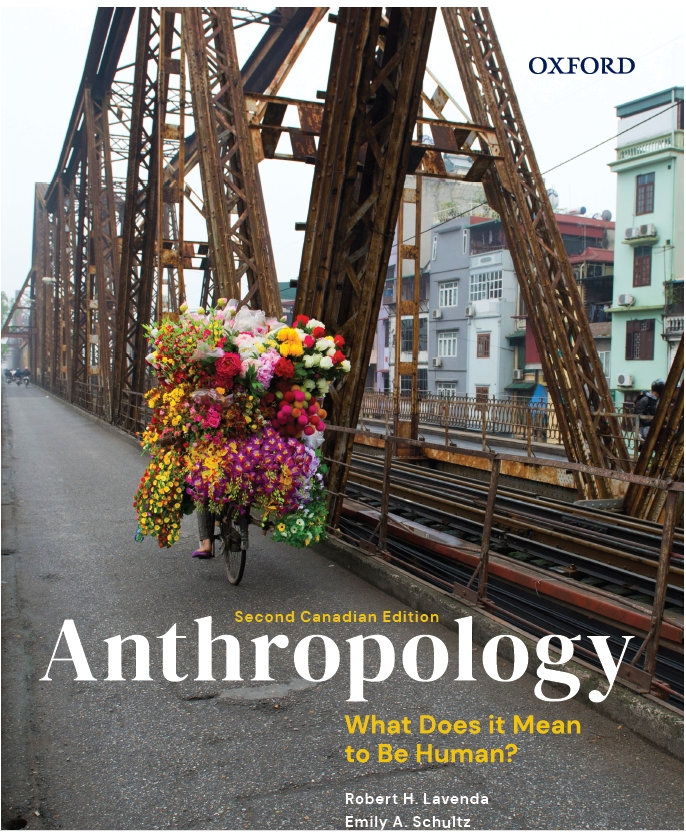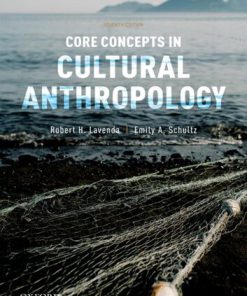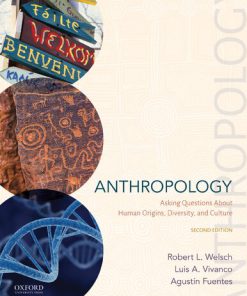Anthropology What Does It Mean to Be Human 2nd Canadian Edition by Robert Lavenda, Emily Schultz, Cynthia Zutter ISBN 9780199032563 0199032564
$50.00 Original price was: $50.00.$25.00Current price is: $25.00.
Anthropology What Does It Mean to Be Human 2nd Canadian Edition by Robert Lavenda, Emily Schultz, Cynthia Zutter – Ebook PDF Instant Download/Delivery: 9780199032563 ,0199032564
Full download Anthropology What Does It Mean to Be Human 2nd Canadian Edition after payment

Product details:
ISBN 10: 0199032564
ISBN 13: 9780199032563
Author: Robert Lavenda, Emily Schultz, Cynthia Zutter
Anthropology What Does It Mean to Be Human 2nd Canadian Edition Table of contents:
1 What Is Anthropology?
What Is Anthropology?
What Is the Concept of Culture?
What Makes Anthropology a Cross-Disciplinary Discipline?
Biological Anthropology
Cultural Anthropology
Linguistic Anthropology
Archaeology
Applied Anthropology
Medical Anthropology
The Uses of Anthropology
Chapter Summary
For Review
Key Terms
References
2 Why Is the Concept of Culture Important?
How Do Anthropologists Define Culture?
Culture, History, and Human Agency
Why Do Cultural Differences Matter?
Does Culture Explain Everything?
How Can Cultural Relativity Improve Our Understanding of Controversial Cultural Practices?
The Promise of the Anthropological Perspective
Chapter Summary
For Review
Key Terms
References
3 Why Is Evolution Important to Anthropologists?
What Is Evolutionary Theory?
What Material Evidence Is There for Evolution?
Pre-Darwinian Views of the Natural World
What Is Natural Selection?
How Did Biologists Learn about Genes?
Genotype, Phenotype, and the Norm of Reaction
What Does Evolution Mean to Anthropologists?
Chapter Summary
For Review
Key Terms
References
4 What Can the Study of Primates Tell Us about Human Beings?
What Are Primates?
How Do Anthropologists Classify Primates?
What Do We Know about the Kinds of Primates Living Today?
What Is Ethnoprimatology?
Are There Patterns in Primate Evolution?
How Do Paleoanthropologists Reconstruct Primate Evolutionary History?
Chapter Summary
For Review
Key Terms
References
5 What Can the Fossil Record Tell Us about Human Origins?
What Is Macroevolution?
What Is Hominin Evolution?
Who Were the First Hominins (6–3 mya)?
Who Were the Later Australopiths (3–1.5 mya)?
How Can Anthropologists Explain the Human Transition?
What Do We Know about Early Homo (2.4–1.5 mya)?
Who Was Homo erectus (1.8–0.3 mya)?
Chapter Summary
For Review
Key Terms
References
6 How Did Homo sapiens Evolve?
How Did Homo sapiens Evolve?
Who Were the Neanderthals (230,000–27,000 Years Ago)?
What Do We Know about the Culture of the Middle Paleolithic/Middle Stone Age?
What Do We Know about Anatomically Modern Humans (300,000 Years Ago to Present)?
What Do We Know about the Upper Paleolithic/Late Stone Age (40,000–10,000 Years Ago)?
What Happened to the Neanderthals?
How Many Kinds of Upper Paleolithic/Late Stone Age Cultures Were There?
Where Did Modern Homo sapiens Migrate in Late Pleistocene Times?
Two Million Years of Human Evolution
Chapter Summary
For Review
Key Terms
References
7 What Can Evolutionary Theory Tell Us about Human Variation?
What Is Microevolution?
Can We Predict the Future of Human Evolution?
Chapter Summary
For Review
Key Terms
References
8 How Do We Know about the Human Past?
What Is Archaeology?
How Do Archaeologists Interpret the Past?
Whose Past Is It?
Plundering the Past
Contemporary Trends in Archaeology
Chapter Summary
For Review
Key Terms
References
9 Why Did Humans Settle Down, Build Cities, and Establish States?
How Is the Human Imagination Entangled with the Material World?
Is Plant Cultivation a Form of Niche Construction?
How Do Anthropologists Explain the Origins of Animal Domestication?
When and Why Did Animal Domestication Begin?
What Influenced the Beginnings of Domestication at Different Places around the World?
How Did Domestication, Cultivation, and Sedentism Begin in Southwestern Asia?
What Were the Consequences of Domestication and Sedentism?
How Do Anthropologists Define Social Complexity?
What Is the Archaeological Evidence for Social Complexity?
How Can Anthropologists Explain the Rise of Complex Societies?
Chapter Summary
For Review
Key Terms
References
10 Why Do Anthropologists Study Economic Relations?
How Do Anthropologists Study Economic Relations?
How Do Anthropologists Study Production, Distribution, and Consumption?
How Are Goods Distributed and Exchanged?
Does Production Drive Economic Activities?
Why Do People Consume What They Do?
The Anthropology of Food
Chapter Summary
For Review
Key Terms
References
11 What Can Anthropology Teach Us about Sex, Gender, and Sexuality?
How Did Twentieth-Century Feminism Shape the Anthropological Study of Sex, Gender, and Sexuality?
How Do Anthropologists Organize the Study of Sex, Gender, and Sexuality?
How Are Sex and Gender Affected by Other Forms of Identity?
How Do Ethnographers Study Gender Performativity?
How Do Anthropologists Study Connections among Sex, Gender, Sexuality, and the Body?
How Do Anthropologists Study Relations between Sex, Gender, and Sexuality?
How Does Ethnography Document Variable Cultural Understandings Concerning Sex, Gender, and Sexuality?
Chapter Summary
For Review
Key Terms
References
12 Where Do Our Relatives Come From and Why Do They Matter?
How Do Human Beings Organize Interdependence?
What Is Kinship?
What Is Adoption?
How Flexible Can Relatedness Be?
What Is Marriage?
What Is a Family?
How Are Families Transformed over Time?
How Does International Migration Affect the Family?
What Is Friendship?
Chapter Summary
For Review
Key Terms
References
13 How Do Anthropologists Study Political Relations?
How Are Culture and Politics Related?
How Do Anthropologists Study Politics?
How Do Anthropologists Study Politics of the Nation-State?
What Happens to Citizenship in a Globalized World?
Global Politics in the Twenty-First Century
Chapter Summary
For Review
Key Terms
References
14 What Can Anthropology Tell Us about Social Groups and Inequality?
What Are Naturalizing Discourses?
How Do Anthropologists Study Human Rights?
Chapter Summary
For Review
Key Terms
References
15 Why Is Understanding Human Language Important?
What Makes Language Distinctively Human?
How Are Language and Culture Related?
How Do We Communicate without Language?
How Do Languages Change over Time?
What Does It Mean to “Learn” a Language?
What Happens When Languages Come into Contact with One Another?
What Is Linguistic Inequality?
What Is Lost if a Language Dies?
How Are Language and Truth Connected?
Chapter Summary
For Review
Key Terms
References
16 How Do We Make Meaning?
What Is Play?
What Is Art?
What Is Myth?
What Is Ritual?
How Are World View and Symbolic Practice Related?
World Views in Operation
Maintaining and Changing a World View
How Are World Views Used as Instruments of Power?
Why Study Anthropology?
Chapter Summary
For Review
Key Terms
References
Glossary
Index
People also search for Anthropology What Does It Mean to Be Human 2nd Canadian Edition:
anthropology what does it mean to be human pdf
anthropology what does it mean to be human 5th edition
anthropology what does it mean to be human 4th edition
anthropology what does it mean to be human 3rd edition
what does it mean to be human in anthropology
Tags: Robert Lavenda, Emily Schultz, Cynthia Zutter, Anthropology, Human
You may also like…
Politics & Philosophy - Anthropology
Uncategorized
Ace Voices What It Means to Be Asexual Aromantic Demi or Grey Ace 1st Edition Eris Young.
Computers - Artificial Intelligence (AI)
What Is ChatGPT Doing and Why Does It Work 1st Edition Stephen Wolfram
Society Politics Philosophy Anthropology
Politics & Philosophy - Anthropology











